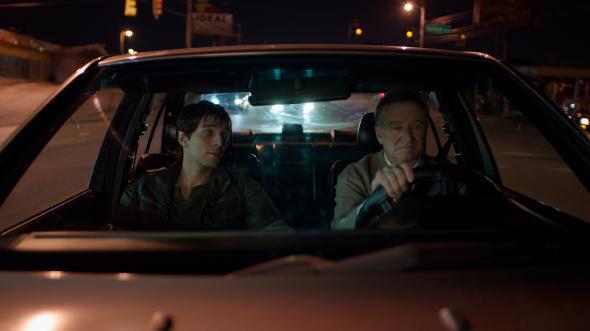Most of the critical discussion around Boulevard, the just-released Dito Montiel drama starring Robin Williams, has focused on that fact that it was the actor’s last on-screen role. Though filming was completed in 2013, Williams’ tragic suicide last summer unavoidably warps one’s viewing of the film: You can’t help but search for resonances between Williams’ character—a heavily repressed, melancholic soul with a secret—and the actor himself. And, armchair psychologizing aside, the finality of Williams’ death predisposes you to hope for a great final performance.
Unfortunately, despite the generosity with which many viewers will approach the film, Boulevard does not offer the concluding triumph that a performer of Williams’ caliber deserves. Indeed, Montiel’s feature is all the more disappointing, because while it begins with a rich premise and a degree of subtlety, it utterly fails to maintain a coherent emotional logic, leaving Williams and his co-stars fumbling about in one of the most frustrating gay-themed films I have ever seen.
Williams plays Nolan Mack, a sixty-something banker who has lived a comfortable, if apparently banal, existence in Nashville, Tennessee, with his wife Joy (Kathy Baker) for decades. The placidity of Nolan’s routinized life, underscored by a muted color pallet and delicate scoring, is disturbed only when he literally crashes into Leo (Roberto Aguire), a male sex worker, while driving home from a visit with his ailing father. Nolan’s journey begins when Leo gets in the car “for a ride,” inaugurating a nonsexual relationship that veers from tender to tempestuous as Nolan uses Leo as a (well-paid) tool to unearth his same-sex desire and, through various acts of self-sabotage, dismantle his companionate marriage.
There are a number of moments in Boulevard, especially during the first half, which gesture teasingly to the insightful, nuanced film it could have been. The most tantalizing of these occurs in Nolan’s drab bank office when he finalizes a mortgage for a gay couple. His orientation to the men is not one of melodramatic pining, but rather of quiet curiosity—it is refreshingly unclear whether he secretly identifies as “gay” or just recognizes something hazily queer in his soul. At home, his relationship with Joy, though sexually detached and oddly polite, also has the genuine warmth of two people who have crafted a successful domestic existence together; Nolan may have denied himself one sort of life due to his powerful “fear of hurting people,” but the one he’s chosen isn’t entirely unhappy or empty. Even his interactions with the troubled Leo start on an intriguing note, mixing basic sexual attraction, a childlike need for affection, and a fatherly savior complex into one messy dynamic. All these choices give more texture and color to the figure of the “closet case” than such figures are usually afforded, and encountering them early on in the film raised my hopes that Boulevard would offer a more complex treatment of sexuality and “coming out” than our contemporary political narratives tend to allow.
Sadly, these hopes were dashed as the movie went on, devolving as it did into a series of cruel pimp/unstable hooker set-pieces, a completely out-of-character confession, and I finally want to start living clichés that felt as if they’d come from a different script. I went into Boulevard believing, erroneously, that Williams’ work on the project was still unfinished when he died, so I initially attributed some of the emotional nonsensicality and unevenness of the second half to difficult choices in the editing room. When I discovered later that Williams did finish filming, these missteps seemed even more annoying. By the time a totally random inspirational voiceover intrudes atop suddenly major-key guitars, it is clear Montiel was after a boringly clean and predictable ending all along.
That’s a shame, because even as the LGBTQ equality movement sails forward for many of us, there will continue to be individuals like Nolan who miss the boat, or who consciously choose not to get onboard for one reason or another. And their stories, in all their untidy complexity, are far more interesting than the ones we already know.
